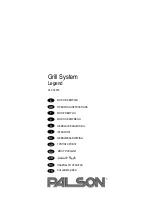
21
6. Cross the legs on top of spit rod; tie string around the
crossed legs.
7. Connect the twine holding the legs, to the string holding the
wings, and knot. Cut off any bits of hanging string.
8. Slide on the second fork pushing the tines into the
drumsticks.
9. Center the food and forks on the rod and tighten the thumb-
screws. The bird should be firmly in place on the rotisserie
spit rod.
ROTISSERIE CHART
Use a portable meat thermometer to check internal doneness of
the food.
Turn off rotisserie burner when meat thermometer reads 5°F/3°C
lower than desired internal temperature. Continue rotating, hood
closed, for 10 minutes before carving.
Timing is affected by weather conditions such as wind and
outside temperature.
TIPS FOR OUTDOOR GRILLING
Before Grilling
■
Thaw food items before grilling.
■
Preheat grill on high (use all grill burners) 10 minutes. The
hood must be closed during preheating. There is no need to
use the back rotisserie burner for preheating. Preheating
provides the high heat needed to brown and seal the juices.
■
Shorten the preheat time when grilling high-fat cuts of meat
or poultry, such as chicken thighs. This will help reduce
flare-ups.
■
Lightly oil the grill grates or the food when cooking low-fat
cuts of meat, fish or poultry, such as lean hamburger patties,
shrimp or skinless chicken breasts.
■
Using too much oil can cause gray ash to deposit on food.
■
Trim excess fat from meats prior to cooking to reduce
flare-ups.
■
Make vertical cuts at 2" (5 cm) intervals around the fat edge
of meat to avoid curling.
■
Add seasoning or salt only after the cooking is finished.
During Grilling
■
Turn foods only once. Juices are lost when meat is turned
several times.
■
Turn meat just when juices begin to appear on the surface.
■
Avoid puncturing or cutting the meats to test doneness. This
allows juices to escape.
■
It may be necessary to lower the heat setting for foods that
cook a long time or are marinated or basted in a sugary
sauce.
■
If using a high flame, add barbecue sauce only during the last
10 minutes of cooking to avoid burning the sauce.
■
The degree of doneness is influenced by the type of meat, cut
of meat (size, shape and thickness), heat setting selected,
and length of time on the grill.
■
Cooking time will be longer with an open grill cover.
Cooking Methods
Direct Heat
Cooking by direct heat means the food is placed on grill grates
directly above lighted burners. Hood position can be up or down.
If hood is in the up position, total cooking times may be longer.
Direct heat sears the food. Searing is a process that seals natural
juices in food by cooking with intense heat for a short period of
time. While juices stay inside, the outside is browned with a
flavorful grilled coating.
Indirect Heat
For best results, do not select the indirect heat cooking method
when it is windy.
Cooking by indirect heat means the food is placed on the grill
grate above an unheated burner, allowing heat from lighted
burner(s) on either side to cook the food.
If possible, turn on 2 burners. Cook with the hood down. This will
shorten the cooking time.
Food
Weight
Internal
Doneness or
Temperature
(°F/°C)
Approximate
Grilling Time
(min/lb)
Beef
Roasts
Rib Eye
Sirloin Tip
Rib, boneless
4-6 lbs
(1.5-2.2 kg)
Medium-rare
(145°F/ 63°C)
Medium
(160°F/71°C)
15-20
20-25
Poultry
Chicken
Turkey, whole
3-6 lbs
(1.1-2.2 kg)
7-10 lbs
(2.6-3.7 kg)
Breast
(170°F/ 77°C)
Thigh
(180°F/82°C)
Breast
(170°F/77°C)
Thigh
(180°F/82°C)
25-30
25-30
11-20
11-20
Lamb
Boneless leg
4-7 lbs
(1.5-2.6 kg)
Medium
(160°F/71°C)
20-25
Pork
Loin roast,
boneless
4-6 lbs
(1.5-2.2 kg)
Medium
(160°F/71°C)
20-23
WARNING
Food Poisoning Hazard
Do not let food sit for more than one hour before or
after cooking.
Doing so can result in food poisoning or sickness.
Summary of Contents for 720-0336B
Page 28: ...28 REPLACEMENT PARTS ...
Page 59: ...59 PIEZAS DE REPUESTO ...
Page 91: ...91 PIÈCES DE RECHANGE ...















































